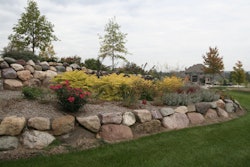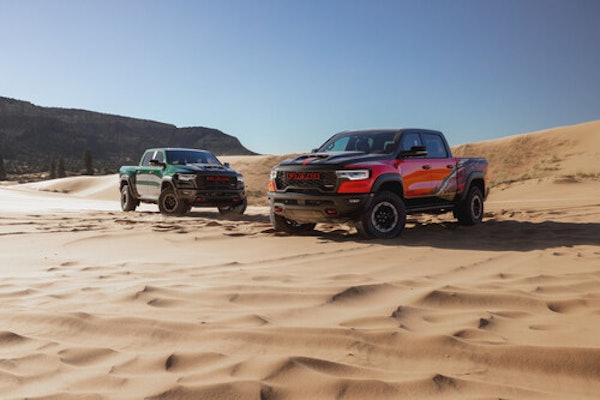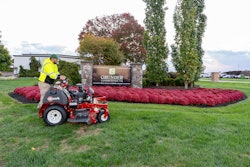 Photo: Verizon Connect
Photo: Verizon ConnectVerizon Connect has been keeping an eye on the changing technology and which are most likely to impact 2020 and the near future.
Kevin Aries, head of global product success at Verizon Connect shares his thoughts on how the five listed trends will affect professional landscapers.
Video as data
Aries says the way people use video continues to evolve and video as data is becoming more prevalent as the internet of things (IoT) continues to mature and smart devices add video connectivity. Safety is one of the main reasons video is being integrated into many devices.
“Professional landscapers can use video data to help improve safety and business results, among other uses,” he says. “Artificial intelligence-enabled video dash cams, like Verizon Connect’s Integrated Video solution, can provide near real-time information as it relates to safety and general driving behavior of landscapers on the road.”
While intelligent sensors can notify landscape company owners of unsafe driving behaviors, video adds another layer of context that helps owners understand the road conditions their fleets are encountering during the day.
“Video data can help a fleet manager react when harsh driving situations occur, so they can begin working to resolve the situation,” he says. “Moreover, it can help protect drivers and companies from liability in the case of an accident, when there are questions about the cause of an accident. Landscape companies can also use video data proactively as another piece of empirical data on driver behavior. Instead of going by a ‘gut feeling’ or second-hand information, the fleet manager has the video data to help provide tailored driver coaching.”
Artificial intelligence
Artificial intelligence is a technology that is being leveraged with company fleets to improve productivity and safety. Aries says companies that keep pace with technological advancements will gain a lead on their competitors and spur more widespread adoption.
“Artificial intelligence will continue to be one of the biggest trends in technology in 2020 as companies find ways to empower machines to automatically and smartly execute tasks,” he says. “This doesn’t mean AI will replace workers, but rather the technology will help lighten the load for workers and enable them to work more efficiently. This holds true for landscapers.”
Electric vehicles
While electric vehicles currently make up a small subset of vehicles on the road, Aries says they are expected to grow from 3.2 million in 2019 to over 26 million by 2030 as both the public and private sectors seek more sustainable operations.
“Professional landscapers absolutely can benefit from electric vehicles,” Aries says. “The main advantage to utilizing EVs is the impact on efficiency. Adopting these vehicles can help reduce fuel-usage, which in turn leads to cost-savings that affect the bottom-line of a business.”
He says that when EVs are paired with fleet management technology, landscape professionals can track data points such as charging time, average kilowatt per hour consumption and the closest charging station.
Concern over the availability of charging stations will diminish as private companies and local, state and federal governments are investing in infrastructure to support electric vehicles.
“This comes at a time when the cost to develop EV is also decreasing,” Aries says. “Both of these factors will increase the proliferation of commercial EVs. Landscape companies who want to differentiate themselves in a crowded market might consider ‘sustainable operations’ as a way to attract new customers and business.”
Autonomous mobility
Currently, advanced driver assistance systems come standard in most vehicles, but Aries says we are still a long way from having fully autonomous vehicles implemented on a large scale.
However, he says with 5G technology rolling out, the network needed for autonomous mobility is becoming a reality.
“Landscape companies can start making strategic investments to position themselves to benefit from autonomous technology that can help increase the efficiency, productivity and safety of vehicle fleets and a mobile workforce,” Aries says.
5G
Speaking of 5G, this new level of wireless technology has arrived, with Verizon being the first to launch a commercial 5G service in 2019. It recently expanded 5G Ultra Wideband availability to parts of 31 cities.
“5G represents the next-generation wireless network that has increased capacity, faster speeds and lower lag,” Aries says. “These features are expected to support a new class of technologies and products for businesses.”
Aries says Verizon is partnering with universities, startups and established companies to develop 5G concepts and explore cases that benefit from the new networks high speeds, wide bandwidth and low latency.
“As these concepts and products enter the market and partnerships become available, businesses can look to take advantage of next-gen solutions,” Aries says. “In the meantime, understanding and preparing for 5G is essential for landscapers to prepare for the future and ultimately keep apprised of new technologies poised to impact business operations and serving customers.”










